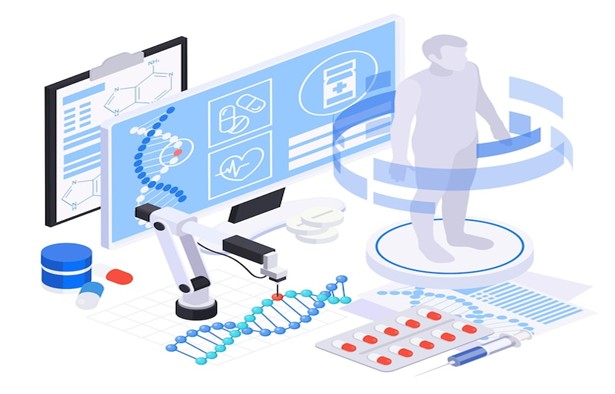
Precision medicine is a branch of healthcare that customizes medical care to individual patients' specific requirements by utilizing lifestyle factors, genetic information, and other data. Artificial intelligence technology is being used in precision medicine to improve clinical operations, lower costs, and improve patient outcomes. Owing to the growing availability of genetic data, the demand for more individualized and efficient medical treatments, and the potential for AI to improve medical decision-making, precision medicine has witnessed a significant increase in the adoption of AI.
AI in precision medicine makes it possible to analyze a variety of datasets, such as patient health records, proteomics, and genomes, to determine personalized treatment regimens. Healthcare practitioners can customize medications to optimize effectiveness and minimize side effects by having a thorough understanding of each patient's unique genetic makeup and disease features.
AI in precision medicine together have the potential to drastically change the healthcare industry. The goal of precision medicine approaches is to determine unique patient profiles that have unusual treatment outcomes or unique medical needs. By using advanced computational techniques and interference, AI plays a crucial part in assisting the system to achieve important insights, improve its capacity for reasoning, and support ongoing learning.
The aim of individualized treatment is impacted by artificial intelligence (AI) in precision medicine approaches in five ways: risk prediction/diagnosis using genetic or other characteristics, and therapy planning utilizing clinical, genomic, or social and behavioral determinants of health.
Contents
- Key Takeaways on AI in Precision Medicine
- Role of AI in Precision Medicine
- Future of AI in Precision Medicine
- Conclusion
Key Takeaways on AI in Precision Medicine
Key takeaways on the role of AI in precision medicine highlight its transformative potential in personalizing healthcare and improving patient outcomes.
- AI can synthesize new drug molecules, leading to innovative treatments for previously untreatable conditions, potentially reducing drug discovery costs by up to 70%.
- By analyzing biological data, AI identifies promising drug candidates more efficiently, allowing for drugs tailored to individual patient characteristics.
- AI algorithms process extensive patient data, including genetic information and lifestyle factors, to create customized treatment plans that enhance outcomes and quality of life.
- AI is pivotal in genomic medicine, identifying genetic variations that affect disease susceptibility and treatment responses, and facilitating more effective interventions.
- AI enhances the clarity of medical images from MRI and CT scans, aiding in accurate diagnoses and early disease detection.
- Machine learning algorithms can predict disease progression and treatment responses using historical and real-time data, enabling proactive healthcare measures.
- AI supports healthcare providers by offering insights that improve decision-making processes, including forecasting disease trajectories and identifying potential risks or side effects.
- Continuous monitoring of patient data through AI systems allows for timely alerts regarding health issues, supporting preventive care strategies.
- The integration of AI promotes ongoing improvements in treatment methodologies and patient care through continuous learning from diverse datasets.
Role of AI in Precision Medicine
Artificial Intelligence (AI) is fundamentally transforming precision medicine by facilitating personalized healthcare that accounts for individual differences in genetics, environment, and lifestyle. This innovative approach enhances disease prevention, diagnosis, and treatment, leading to more effective and tailored healthcare solutions.
- Enhancing Disease Prevention
- Personalized Diagnosis
- Tailored Treatment Strategies
- Data Integration and Analysis
- Advancements in Pharmacogenomics
- Natural Language Processing (NLP) Applications
Future of AI in Precision Medicine
The future of AI in precision medicine is on the brink of transformative advancements that promise to enhance patient care, streamline drug development, and improve diagnostic accuracy.
- Generative AI in Drug Discovery
- Enhanced Diagnostic Capabilities
- Integration of Biomarkers
- Real-Time Monitoring and Predictive Analytics
- Collaboration Between AI and Healthcare Professionals
- Advancements in Pharmacogenomics
- Virtual Clinical Trials
- Ethical Considerations and Data Security
Conclusion
AI is a fundamental pillar in the advancement of precision medicine, fostering innovations that improve diagnostics, expedite drug development, and enable personalized treatment strategies. The integration of AI technologies heralds a future where customized healthcare solutions become standard practice, leading to substantial enhancements in patient care and outcomes across diverse medical disciplines.